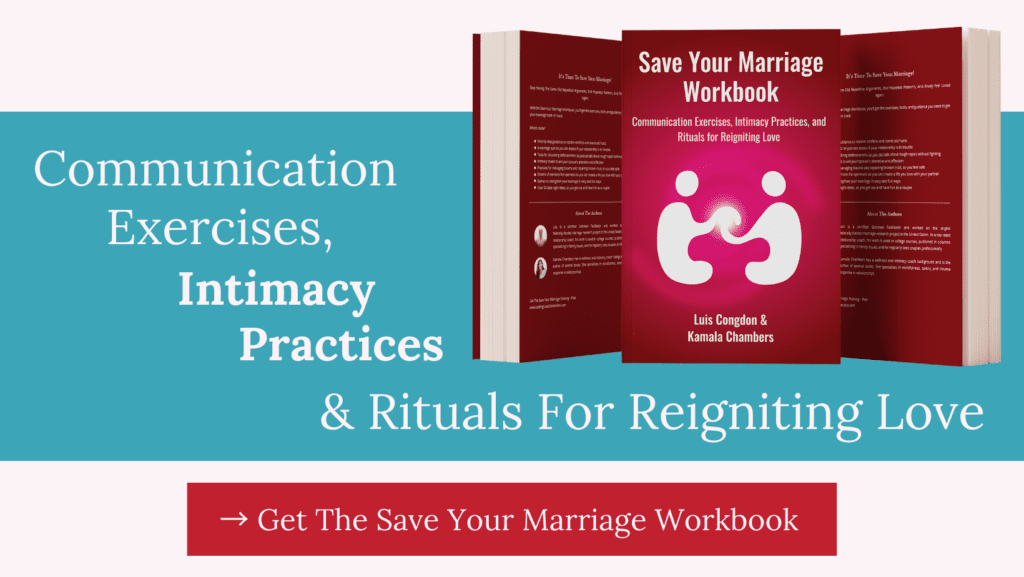“He gets defensive when I tell him how I feel. What can I do?”
Understandably, you feel frustrated when you try to talk to your husband or boyfriend about your feelings, and he gets defensive.
It can be hurtful if he doesn’t hear you or understand you.
Table of Contents
You have hurt feelings, and that’s okay

If you’re wondering, “Why do guys get defensive,” you’re not alone.
Many wives struggle to communicate their feelings without their husbands becoming defensive or angry.
Sometimes, their husbands yell at them.
Having a defensive partner can leave you heartbroken and lead to low self-esteem or self-doubt. It can feel like you have to walk on eggshells, even when you’re just trying to have a conversation.
Being with a defensive person can be frustrating and upsetting.
You may feel he’s ignoring you or doesn’t care about your feelings.
When your husband responds defensively, it may even make you feel worthless.
It can make you feel helpless because you can’t get through to him. Further, understanding can be even more challenging when dealing with an emotionally unavailable man.
“He gets defensive when I tell him how I feel, and it hurts.”
Maybe it feels like he’s putting up a wall between you, and connecting is impossible. All you want is to reach out and touch their heart, but it can feel like he’s built an impenetrable fortress around it.
It’s frustrating because you know he’s capable of being the loving, vulnerable human being you fell in love with. But right now, maybe it feels like he’s a million miles away. And it’s heart-wrenching.
He’s hurting too
People react differently to emotional situations. Some people may display a defensive attitude because they’re overwhelmed or afraid of doing something wrong and being hurt.
Others may react because they’re used to being on the receiving end of criticism and trying to protect themselves.
Whatever the reason, there are ways of dealing with the situation so you can still communicate effectively with your husband.
Related Article: When You Hurt Someone You Love
Why does he get defensive when I express my feelings?

Your husband’s defensiveness may be a way of protecting themselves from feeling the full weight of how their behavior is impacting you.
If your partner has defensive behavior when expressing your feelings, take just a few minutes and try to see things from their perspective. They may need a little while to process your words and understand how their behavior affects you. If you can have a conversation about this with empathy and understanding, you may be able to help your partner see how their behavior is impacting you and find a way to move forward together.
What does it mean when your partner gets defensive?

If you’re wondering, “Why do men get defensive?”. it could be because they feel attacked. Typically, defensiveness and defensive listening mean they feel threatened or attacked on some deeper emotional level. This can be especially frustrating if you’re trying to have a calm, rational conversation about something bothering you. It’s important to remember that when your partner gets defensive, it’s not always about you. Often, their reactions have more to do with their own insecurities, fears, or past experiences than anything else.
For example, maybe they were criticized from a young age, and this makes them more sensitive to anything they perceive as negative feedback. When you share, they may forget that they’re not the only person in the relationship and that you have your own emotions and perspectives– which are valid. Instead, they may take any sign of criticism as an attack and shut down without truly hearing your side. If you can approach the situation with empathy and understanding, you’ll be more likely to defuse the tension and get to the heart of the matter. With patience and communication, you can help your partner feel safer and more open to sharing their true feelings.
How do you respond to a defensive partner?
Poor communication skills are one of the main reasons why relationships fail. If you and your partner are constantly arguing and struggling to communicate effectively, you can do some things on your own to improve communication in your relationship. One key thing to remember is that when your partner’s emotions run high, try to remain calm and avoid getting upset.
Instead, try to empathize with your partner and understand their point of view. Once they’ve calmed down, they can hear your point of view more easily. If you can learn to respond when you’re not triggered, it will go a long way toward shifting your relationship dynamics.
Ways to stop his defensive behavior
Being in a committed relationship means being there for each other during the good and bad times. However, even the strongest relationships can be strained at times. One of the most common issues couples face is defensiveness.
“Every time I express my feelings, he gets mad. How do I get it to stop?”
When one partner gets defensive, it can quickly lead to an argument. If you find yourself in this situation, there are some things you can do to help dissipate your partner’s defensiveness.
1. Communication skills
First, communicate openly with each other. This means listening as well as speaking. If you’re finding that your partner is regularly defensive, it may be helpful to talk to him about it.
Oftentimes, defensive reactions result from feeling like we’re being attacked or misunderstood.

If your partner feels like he can’t talk to you without being judged, he may start to put up a wall to protect himself. However, this barrier can prevent you from truly connecting with each other.
The first thing I would suggest is approaching the conversation in a way that feels safe for both of you. Set aside relaxed time free of distractions.
Avoid accusatory language, such as “you always” or “you never.”
Instead, focus on describing how you feel using “I” statements.
For example, “I feel hurt when you speak to me in that tone.” By taking this approach, you can open up a dialogue with your husband and start to look for solutions together.
When you talk to your partner, try to be open and understanding. Let him know you’re not trying to attack him but just want to talk things out. Invite him to do the same.
He may be more likely to let his guard down if he feels he can express himself without being judged or attacked. Undefended communication can help you better understand each other and build a stronger relationship.
To start building healthier communication skills and improve your relationship, sign up for the Save Your Marriage Course.

2. Emotional honesty

Second, be honest with each other. If you’re feeling hurt or frustrated, constructively express those feelings.
Honesty with your partner can help him to stop letting emotions get the best of him.
If you’re honest about your feelings in the moment, your partner will be able to understand where you’re coming from and why you feel the way you do.
It’s human nature to defend ourselves when we feel attacked, sometimes resulting in anger outbursts.
He may need to hear all his behavior’s bad consequences on your relationship.
His understanding can help prevent outbursts and provide a foundation for constructively resolving conflicts.
In addition, honesty can help to build trust and intimacy in a relationship, which is important for a healthy partnership. So if you want your partner to stop being ruled by his emotions, try more honesty.
3. Empathy

Empathy can help to dissipate your partner’s defensiveness and strengthen your relationship.
Try to see things from your partner’s perspective. Putting yourself in their shoes can help you to understand where their behavior is coming from and diffuse the situation.
If you can stop and think about how your partner feels, it can help stop the defensive wall from going up.
If he feels understood, he may be likelier to listen to what you’re saying.
Your empathy can help him feel that you’re coming from a place of love rather than attacking him.
Listen without judgment, and try to see things from his perspective. Listening doesn’t mean you have to agree with everything he says, but it does mean trying to understand where he’s coming from.
If you can show empathy for your partner, it may help him to stop being defensive.
Related Reading: My Husband Doesn’t Listen To Me
4. Stay calm

Try to stay calm and avoid defensive behavior yourself. Your heightened emotions will only make the situation worse.
Of course, that’s easier said than done. But things like self-care, quiet time, and space to deal with stress can help you increase your window of tolerance.
Without self-care, it’s easy to react like he does.
And if you can’t stay calm, that’s ok. Take a break from the conversation and give yourself and your partner time to calm down.
You can also do a few subtle things to deal with his reactions.
Things like your tone of voice, body language, and self-confidence are all things that can help calm his reactivity.
If you think he did something wrong, stop nagging or questioning him. Instead, try to understand why your partner is reacting this way.
Focus on having an adult conversation and approach him with a soft tone and open body language.
If he’s feeling overwhelmed, see if you can help him to process his feelings by talking about them. If he’s afraid of doing something wrong, assure him you’re not trying to hurt him and want to share your emotions without blaming him.
It may also be helpful to talk about how you’re feeling in a non-judgmental way.
For example, “I feel hurt when you react defensively to what I say.”
This can help your partner see the situation from your perspective and may encourage him to open up more.
If your partner is still resistant to talking about his feelings, you may need professional help. Online couples counseling will assist you in communicating with each other and resolving any underlying issues.
Does defensiveness mean guilt?

It’s a common belief that acting defensively means you must be guilty of something. After all, why else would you need to defend yourself?
Quick reactions may be an indication of guilt.
However, it’s important to point out that we can all be defensive sometimes, even when we’re innocent.
It’s human nature to want to protect ourselves from harm. Sometimes, that means putting up a wall.
Defensiveness can also be a way of regaining control when we feel like losing it.
Defensiveness doesn’t necessarily mean guilt. It means you’re feeling insecure or threatened in some way.
If you can identify the root cause of the defensiveness, you’ll be one step closer to resolving the issue.
Explore these questions…
Why are you feeling defensive?
What are you afraid of?
What are you needing?
How can I help?
What are you asking for?
Is being defensive toxic?

If you’re married or in a more serious relationship, you realize dealing with emotions calmly at the moment has better results. You also know that being defensive and saying things you regret afterward can be detrimental.
Reacting rather than responding is like a brick wall between you and your spouse. You’re not even trying to see things from their perspective when you’re reacting.
Being defensive shuts down the ability to calmly talk and kills emotional intimacy.
To have a healthy marriage, you need to be able to have conversations without being defensive.
Listen to your spouse, understand their perspective, and then share your own without feeling like you have to defend yourself. It’s not easy, but it’s so worth it. After all, your marriage is worth saving, right?
“My husband always thinks I’m attacking him”
Or maybe you’re thinking, “I can’t express my feelings to my boyfriend without him getting mad or in a bad mood.”
For example, you feel like your husband wants sex but not intimacy. You tried to initiate a conversation about feeling emotionally disconnected, and he responded defensively.
How can we truly connect with someone if we can’t be vulnerable?
When we’re defensive, we protect ourselves from being hurt and prevent ourselves from experiencing the joys of intimacy.
Being open and honest allows us to be seen and loved for who we are.
Yes, it’s scary to let down our defenses. Especially if you and your partner were hurt in a past relationship.
But connecting vulnerably is also incredibly rewarding and can be the best therapy for your marriage.
So next time you’re tempted to put up a wall, take a deep breath and step out into the open. You might just be surprised at how good it feels.
Can defensiveness ruin a relationship?

We’ve all been there before. A loved one says or does something that hurts our feelings, and we immediately put up our guard.
Maybe we lash out in anger or withdraw into ourselves and refuse to start talking. Either way, defensive behavior, and it’s not likely to do any good for our relationship.
Sure, being defensive might help us feel better in the moment, but it will not help resolve the issue. In fact, it’s likely to make things worse.
When your husband responds defensively, you may feel dismissed or even start to wonder if he still loves you.
When we put up a defensive barrier, we’re essentially saying that we’re unwilling to listen to what the other person says.
We’re not willing to work together to find a solution. We’re focused on protecting ourselves, which will not help build a strong, healthy relationship.
Bad consequences
When we get defensive in our relationships, it usually means we somehow feel attacked.
Whether our partner is critical of us or disagrees with us, our first instinct is often to put up our barriers and protect ourselves.
Unfortunately, chronic defensiveness or a narcissistic behavior pattern can hurt our relationships. For one thing, it creates an atmosphere of distrust and suspicion.
If we’re always on the lookout for signs of criticism, we’re not going to be very open to hearing what our partner has to say.
Additionally, defense mechanisms will likely alienate partners and make them feel like they can’t express themselves freely.
Ultimately, being defensive in our relationships can damage the trust and communication that are essential for a successful relationship.
“My husband gets defensive if I bring up things that bother me, and it’s ruining our relationship.”
Hopefully, he’ll reach a point where he can see the only reason he’s reacting is about himself and not really about you.
So next time he’s defending himself, try stepping back and listening to what the other person is saying.
You might be surprised at how much better you’ll feel when you can let down your guard and just be open and honest with each other.
Is defensiveness a trauma response?
Defensive behavior is a common response to feeling threatened or attacked. When we feel defensive, our first instinct is to protect ourselves from the person or situation we perceive as threatening.
Unfortunately, this defense mechanism often does more harm than good. It fails to resolve the underlying issue and can lead to other relationship problems, such as a communication breakdown, mistrust, and resentment.
In some cases, defensiveness may even be a sign of trauma or past emotional abuse.
When someone has experienced a traumatic event, they may become hypervigilant and quick to react with defensive behavior to protect themselves from further harm.
If you find your person gets defensive regularly, it might be worth exploring how he’s out of his window of tolerance. Address the underlying trauma.
Undefended communication

Healthy communication in a relationship looks like calmly talking about each person’s feelings and needs without defensive behavior.
It means being emotionally available to each other and being willing to work through conflict. It means feeling safe to express yourself without fear of criticism or judgment.
When you talk openly, it builds trust, emotional intimacy, and connection. If you’re struggling to start talking healthily, it may be helpful to seek out professional help.
An online marriage counselor or relationship coach can provide the tools you need to build a stronger, more connected relationship.
Highly trained relationship coaches will help you break out of unhelpful patterns and develop healthy communication skills.
When two people are in a relationship, it’s important that they can communicate with each other calmly and effectively.
This can be difficult, especially when negative emotions are running high.
One person may feel overwhelmed and triggered, while the other may feel hurt and misunderstood. To move forward, find a way to communicate in a way that is respectful and non-defensive.
One way to do this is to talk to each other calmly. Set aside time each week to talk without interruption.
It’s also important to deal with each other carefully and empathetically. Seek to understand where the other person is coming from, and don’t hesitate to express your feelings and needs.
Communicating in a healthy, non-defensive way can build a stronger, more intimate relationship.
Start with your own feelings
When we experience emotional pain, we often put up walls to protect ourselves. This is especially true in our intimate relationships.
If we feel hurt or rejected by our partner, we may respond with a defensive reaction
Unfortunately, this can create a vicious cycle in which both partners feel hurt and attacked.
The good news is that there is a way out of this cycle. By nurturing your own feelings and mental health, you can help to break the cycle and improve your relationship.
When you take the time to understand where your partner’s defensiveness is coming from, you can begin to see it as a defense mechanism rather than an attack.
This understanding can help you empathize with your partner and provide a space for healing the emotional scars at the root of the problem.
In turn, this can help your partner to feel more understood and appreciated, improving the overall quality of your relationship.
If defensiveness is an issue in your romantic relationship, pick up the Save Your Marriage Workbook.







0 Comments